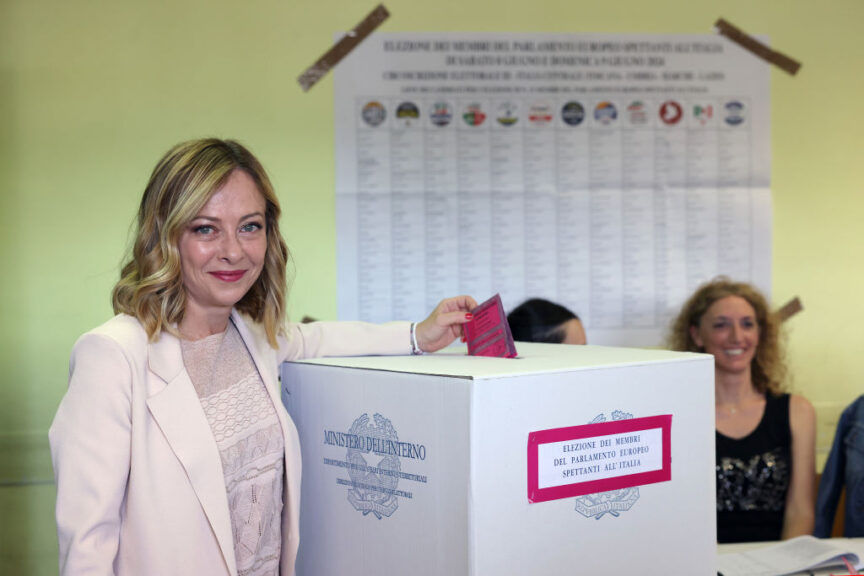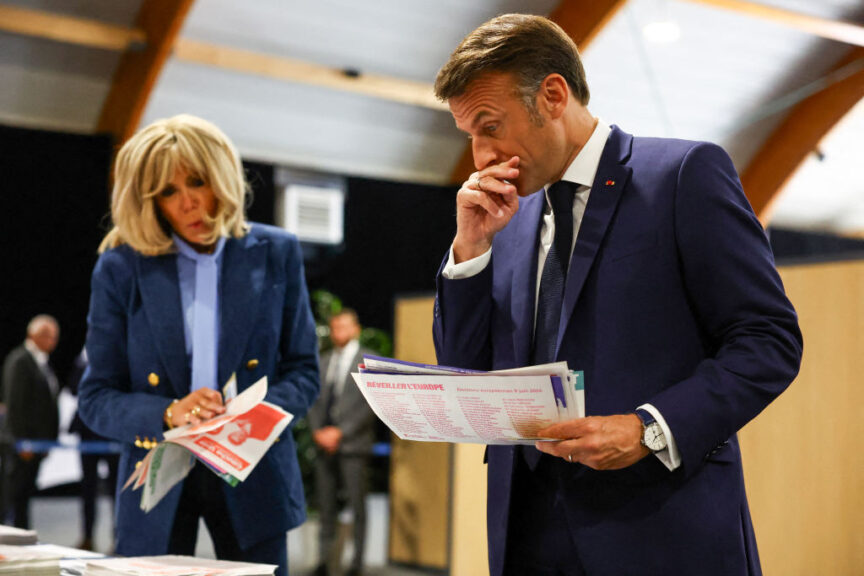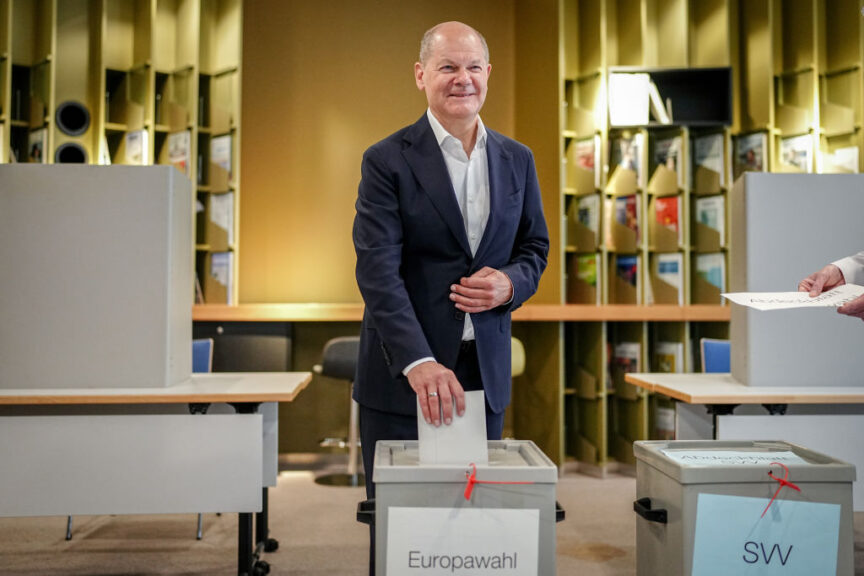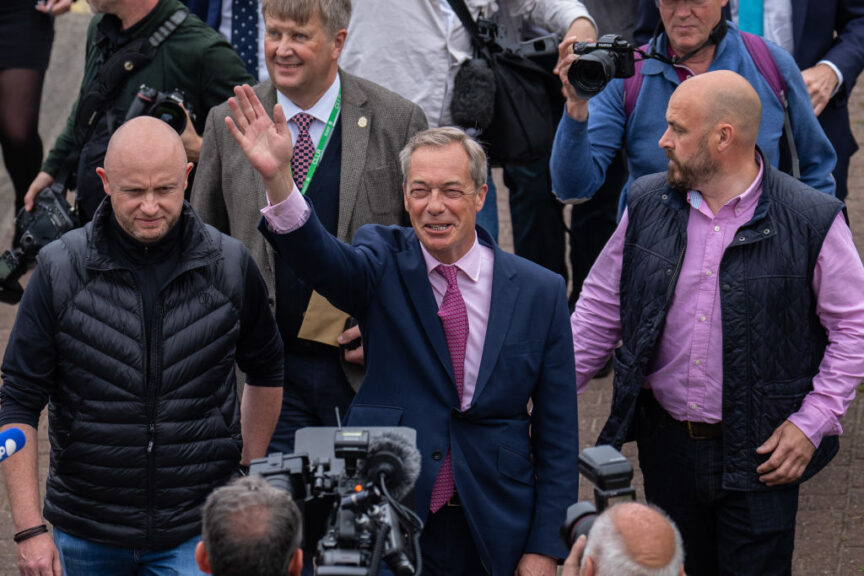 Telmo Pinto/NurPhoto via Getty Images
Telmo Pinto/NurPhoto via Getty Images
The following is an edited transcript of a Morning Wire interview between Daily Wire editor-in-chief John Bickley and Nile Gardiner from The Heritage Foundation.
Conservative and populist parties in several European countries made major gains in European Parliamentary elections Sunday, shaking up several regimes and prompting calls for snap elections. Nile Gardiner, Director of the Margaret Thatcher Center for Freedom at The Heritage Foundation, joined Daily Wire editor-in-chief John Bickley to discuss what is driving Europe to the Right.
JOHN: Welcome, Nile. First, what has unfolded since Sunday?
NILE: Well, I think the results released on Sunday night are nothing less than a political earthquake in Europe. We have seen an emphatic rejection of socialist ruling elites across much of Europe. We have seen a resounding set of victories for parties on the Right in many European countries. And we’ve seen the utter humiliation of big European figures, such as Emmanuel Macron, president of France, Olaf Scholz, the chancellor of Germany, and huge gains for conservative political parties.
JOHN: Who are some of the big names and parties emerging in this sort of rise of the Right?
NILE: The biggest winner, actually, from these European elections has been Georgia Meloni in Italy, whose Brothers of Italy party did extremely well in the European elections, quadrupling their level of support. Meloni has emerged as a very, very powerful leader in Europe. In France, of course, with Marine Le Pen, her political party took over 30% percent of the vote — double the size of the vote for Emmanuel Macron’s party. She will likely face off against Macron in the French presidential race in 2027. And if that election were to be held today, she would probably emerge as the winner.

Alessia Pierdomenico/Bloomberg via Getty Images
JOHN: Now, we saw a snap election called by Macron. What prompted it and how risky is this for the French president and his party?
NILE: In France, Macron’s political party received only around 15% of the vote in the European Parliamentary elections. A massive humiliation really for Macron’s ruling party. Macron therefore decided to call a snap Parliamentary election. It will be held in two rounds, late June, early July. And these elections actually could go very badly potentially for the French president. And he could end up as a lame duck president for the remainder of his term, which stretches until 2027, if his party doesn’t do well in these Parliamentary elections. So, a high-risk gambit, of course, by Macron. In the UK, the British Prime Minister, Rishi Sunak, called an early general election to be held on July the 4th. The conservatives are trailing the opposition Labour Party very heavily in the polls, also, of course, this is a high-risk move by Sunak. He’s come under a lot of criticism for calling this early election and the UK is one of the only parts in Europe where conservatives are actually in real trouble. That’s probably largely the result of having been in power for 14 years and failing to deliver on a lot of the promises made by successive conservative governments. So a rather different situation in the UK compared to most of the rest of Europe, where we are seeing conservative parties really gaining a great deal of ground. The UK is a bit of an outlier in this area compared to the rest of Europe.

HANNAH MCKAY/POOL/AFP via Getty Images
JOHN: Would you argue that a lot of the dissatisfaction is coming from the Right in the UK?
NILE: Yes, I think that a large part of the dissatisfaction with Rishi Sunak is that he’s not being conservative enough as prime minister. And so we’ve seen the rise of Reform, a party headed by Nigel Farage. Reform is now polling at around 15 to even 20% of the vote. These are largely conservative voters who have switched to Reform, so the ruling conservatives actually face a major challenge from Reform on the Right. Of course, the biggest challenge is from the Labor Party on the Left, but the Right in the UK is split right down the middle, and that will be a big factor in most likely allowing the socialists to take power on July the 4th.
JOHN: And what about in Germany? What are some of the trends we’re seeing there and some of the figures that are starting to define those trends?
NILE: In Germany, it’s significant that the ruling socialists headed by Olaf Scholz have done very badly. They pulled in only around 14% of the vote. Also, the Green Party did very, very badly. They’re the main allies of the socialists. They pulled in around 12% of the vote. On the Right, the Christian Democrats did very well, winning nearly a third of the vote. But the AFD political party, which in Germany is designated as hard-Right, they actually pulled in close to around 20% of the European vote, which was a big result for them. Now, I would say that the AFD are quite different from many of the other sort of Right-wing parties in Europe, and they’re somewhat isolated from the main political groupings in the European Parliament. Significantly, Marine Le Pen actually removed the AFD from her political grouping, the Identity and Democracy group within the European Parliament. So there are big differences among parties on the Right within Europe. But undoubtedly, the reality in Germany is that it is moving Right-wards. The Left is actually losing very heavily in Germany and I would expect to see next year with the national elections in Germany a conservative Christian Democratic Union-led government to take power. It’s hard to see how the socialists are going to survive with the national elections in Germany next year. There’s too much power in Brussels. And so most of the political parties on the Right that were successful in this election campaigned against the idea of Euro-federalism and against giving the EU, and the European Commission in particular, more power. We saw the sort of “Brexit Effect” in a big way in this European Parliamentary election.

Kay Nietfeld – Pool/Getty Images
LISTEN: Catch the full conversation on Morning Wire
JOHN: Speaking of Brexit, as you mentioned, Nigel Farage, the architect of Brexit and a pro-Trump ally, has decided to run for Parliament under the Reform Party. How will his entrance into the political arena affect the race?
NILE: Yes, as you point out, Nigel Farage jumped into the race as the leader of the Reform Party just last week. I think it’s a significant game changer in the sense that Farage is joining the race, heading the Reform political party and encouraging many more conservative voters to switch to Reform. No doubt about it, the conservatives are going to lose a lot more seats as a result of Farage’s decision here. I think also, secondly, Nigel Farage has a good chance of winning a parliamentary seat. He’s running in the constituency of Clacton, which is a strongly Euro-skeptic, pro-Brexit area. And if Farage ends up in Parliament, I think he’ll be a very important, influential figure. What this doesn’t change, though, in terms of the big picture, is the fact that Reform, even with 15 to 20% of the vote, will likely end up only with a few seats in Parliament because of the “First-past-the-post” political system. And so the conservatives will remain the biggest party on the Right in the UK in terms of parliamentary seats, regardless of how well Reform actually performs in terms of percentage of the vote, because Reform simply doesn’t have enough firepower to win a large number of MPs under the parliamentary system. So, I expect that Reform, if they do get a few MPs in Parliament, will be closely aligned with the conservatives in terms of how they vote in the next Parliament.

Carl Court/Getty Images
JOHN: While the Right-leaning parties aren’t uniform, there are a lot of unifying characteristics of most of these parties. What would you say are some of the shared ideas and policies driving them?
NILE: Yes, that’s a very good question. I would say that the number one issue in the European Parliamentary elections was really the issue of mass migration, cultural identity – a fear among many in Europe that Europe is taking in far too many migrants — and has taken in too many migrants over the course of the last two decades. This election was a fundamental rejection of mass migration to open borders. So, all of the parties on the Right who gained heavily campaigned on a platform of secure borders, limiting the flow of migrants into their countries, cracking down on migrant crime, and also fighting against Islamification in Europe. Also, high on the agenda are environmental issues as well as a rejection of net zero ideology. Nearly all of the political parties on the Right that won big in the European Parliamentary elections fought against what they believed as far-Left ideological dogma dictating hugely expensive green policies. A third factor was rising Euro-skepticism and a belief among many in Europe that the European Union has become too centralized. And so most of the political parties on the Right that were successful in this election campaigned against the idea of Euro-federalism and against giving the EU and the European Commission in particular more power.
JOHN: Final question. What aspect of these trends in Europe do you feel are important for an American audience to understand?
NILE: From a U. S. perspective, I think the European election results are going to make the Biden White House very nervous. Because some of the big issues that successful parties on the Right in Europe campaigned on are the same issues that American voters are going to be voting on in November. And the European electorate emphatically rejected the kind of woke, Left-wing, elitism that has dominated Europe in recent decades. And many American voters share European voters’ concerns over mass migration, open borders, rising crime, and higher cost of living. So, what happens in Europe, I think is important to what happens in the U.S. as well.
JOHN: Nile, thank you so much for joining us.
NILE: Thank you.

Continue reading this exclusive article and join the conversation, plus watch free videos on DW+
Create Free AccountAlready a member? Log in
Source link

